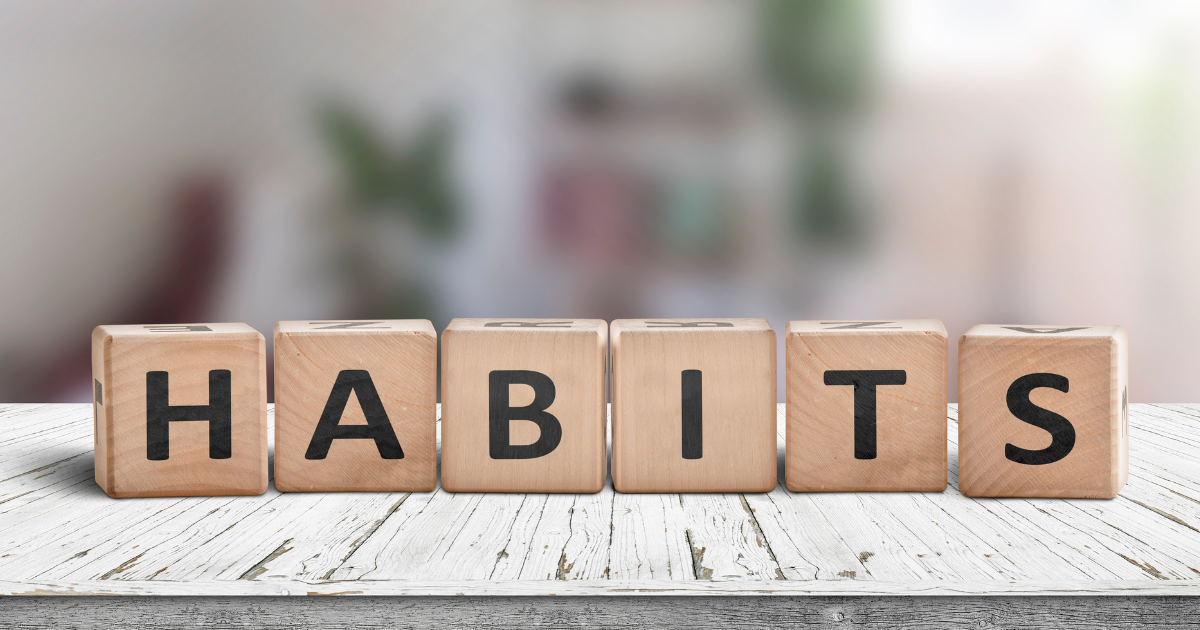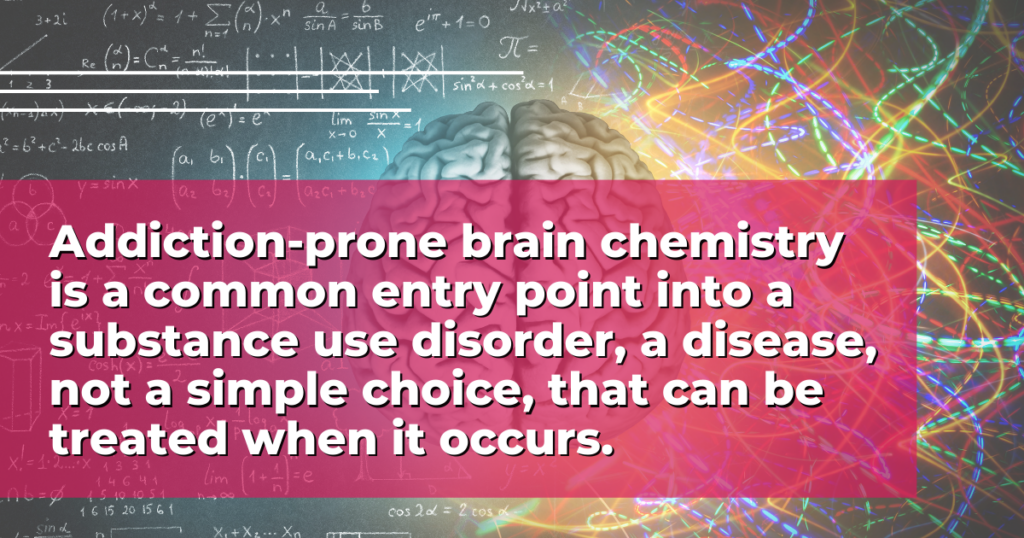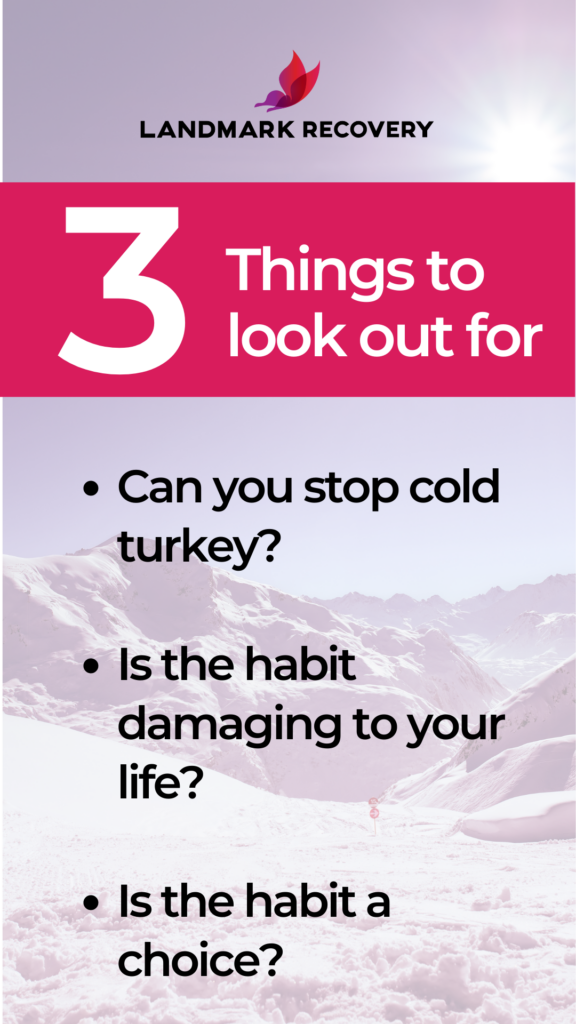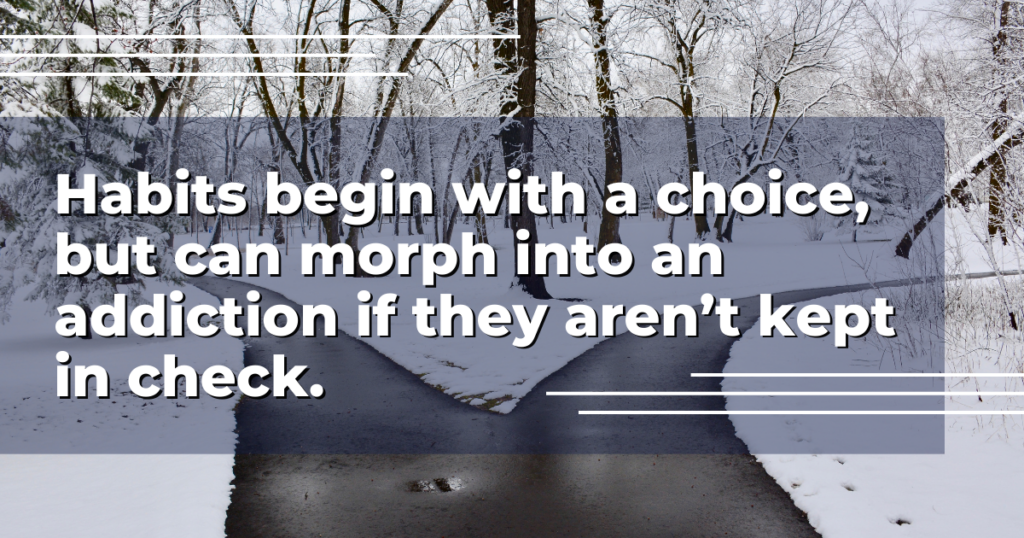Many people overlook key differences between a “habit” and an “addiction.” Habits are more behavioral-based where addictions take control of your behavior. Habits may be challenging to break, but often can be stopped without treatment. Addictions typically require treatment and lifestyle changes to manage.
Are You Developing an Addiction or Is It Just a Habit?
Habits begin with a choice, but can morph into an addiction if they aren’t kept in check or if other factors cause someone to enter the early stages of a substance use disorder. Habits are formed when we repeat a behavior such as drinking a beer after work. Addiction involves loss of control when a habit begins to spiral downward. People with substance addictions don’t feel normal unless they are using a substance.
Habits can still be unhealthy even if they’re not addiction-level. For those who might drink a six-pack of beer in a single week, even though it’s still below the limit that the Centers for Disease Control defines as excessive drinking, the excess calories or long-term health effects might come to affect you later in a way that’s ultimately negative.
There are three things to look out for when determining if you’ve developed a habit or an addiction:
Can you stop cold turkey?
For many people, a habit that they’ve developed is something that they can usually quit with no issue or some effort. An addiction is not something someone can usually just stop suffering from, and therefore if you have severe issues with quitting a habit, perhaps it might not be a habit at all. While it’s easy to see extreme habits as something that we choose to do every day or within a varying time frame, an addiction cannot be defined as a choice. Addiction is a disease that isn’t a choice or moral failing and is mostly determined by brain chemistry or genetics.
Is the habit damaging to your life?
Sometimes a habit can be a minor financial drain, similar to an expensive hobby. A habit could also be something that acts as a time sink. This doesn’t imply that the habit is actively damaging to your life in some way, it just might be a minor inconvenience if it’s a more intense habit. For an addiction, a habit that’s evolved into something negative could be something that you compulsively sink lots of money and time into in ways that negatively impact your quality of life or ability to socially relate to others. An addiction may also severely impact your health in a negative manner, introducing severe consequences that may last a lifetime depending on the substance.
Is the habit a choice?
Much like the question of being able to stop, for some a habit is a choice they make to maintain. An addiction, on the other hand, is something that you don’t choose to repeat consistently. If you’re predisposed to an addiction to something you might think is a new habit, then your “choice” isn’t what you think it is. It’s your brain subconsciously craving a dopamine response to the effects of a drug or beverage.
Spotting Habits and Addictions in Everyday Life
Cracking open an ice-cold beer after you get home from work consistently might be a habit but is it an addiction? Let’s examine the possibilities through a story and by using these three criteria.
When you first arrive home, your so-called habit is to open the fridge, grab a beer, and plop down in your armchair with the TV on. This happens every day after you come through the front door. You decide that this isn’t doing much for you or your health, so you decide to break this so-called habit and go to the gym after work instead.
The day after you resolve to change your behavior, you feel tired and groggy. You decide that going to the gym when you’re feeling tired isn’t a great idea, so you go home and take a nap instead. The next day, you feel even more tired, so you go home and walk through the door.
“Man!” you say. “I’m tired and all, but I could really go for an ice-cold beer right now!” So you reach through the fridge door and break your promise to yourself.
You try to break this so-called habit over and over and over to no avail. You’re trapped in a cycle of continually drinking a six-pack or more every week. It’s starting to get worse and it’s costing you more time and money as the months fall off the calendar.
This is a classic depiction of how an addiction can form. In reality, this isn’t a habit—or at least it started as one until it became more than a habit. A couple things stand out in this story regarding the earlier points: his habit which triggers an alcohol use disorder, his notable series of minor withdrawal symptoms when he tried to stop the first time, and the negative effects his addiction began having on his life and finances. The dopamine feedback loop in his brain became altered through excessive drinking.
For some people, they may not be able to just quit drinking cold turkey. In this case, the gentleman described could not stop cold turkey, most likely because his brain chemistry is biologically predisposed to being stimulated by the presence of alcohol. This is a common entry point into a substance use disorder, a disease, not a simple choice, that can be treated when it occurs. For those who might be consuming very large amounts of alcoholic beverages, quitting cold turkey may be a bad idea due to seizures or other withdrawal symptoms.
Learn More
Habits that become addictions over time aren’t limited to just alcohol. This extends to most major substances that we treat at Landmark Recovery. This is why it’s important to follow a doctor’s direction when taking a prescription or not overdo a substance or drink in everyday life. Sometimes it’s not something that can be helped through moderation, and this is where we come in.
If you’re struggling with an addiction, pick up the phone and call Landmark Recovery at 888-448-0302 today. Our evidence-based treatment methods can help you live beyond an addiction and get back on your feet. We’re on a mission to save a million lives in the next century. Don’t wait to get the help you need.

Choose Recovery Over Addiction
We're here 24/7 to help you get the care you need to live life on your terms, without drugs or alcohol. Talk to our recovery specialists today and learn about our integrated treatment programs.







